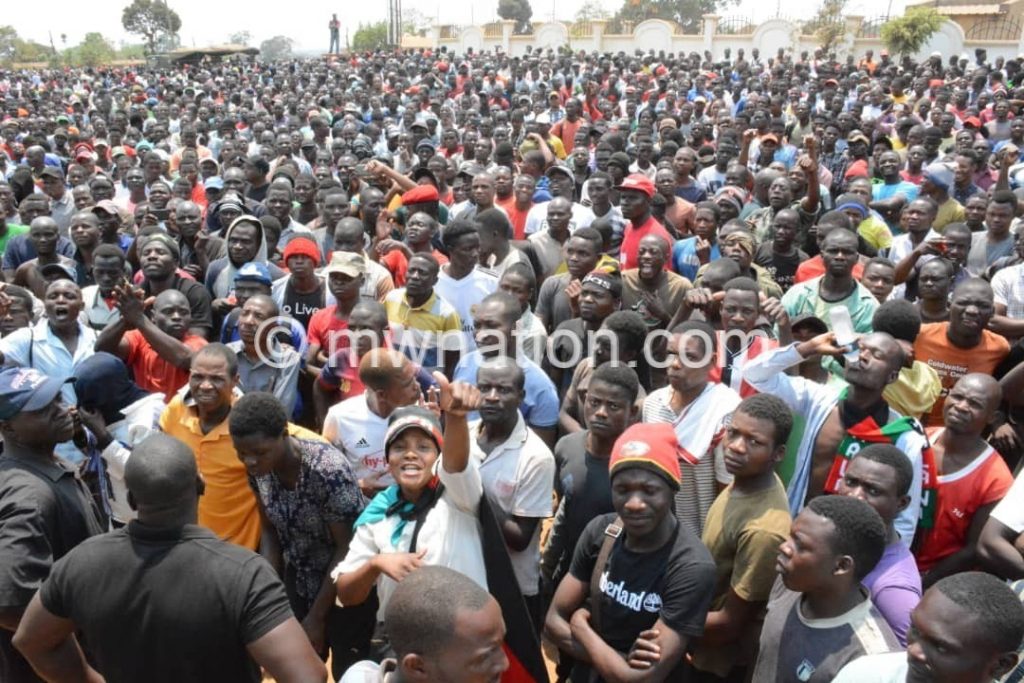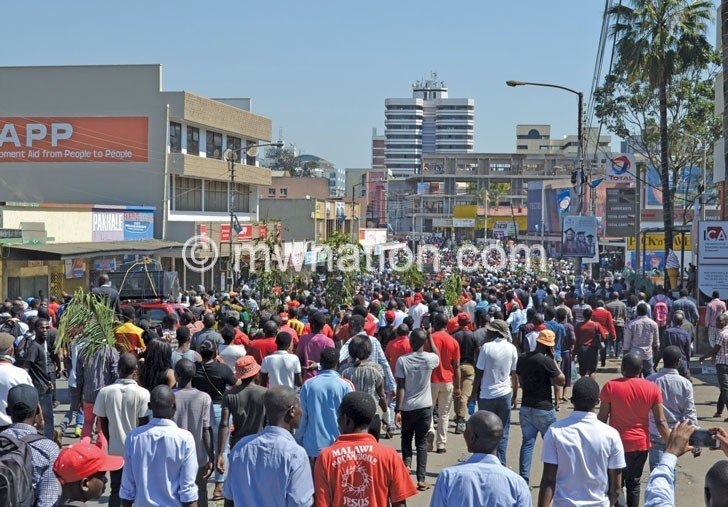Demos and demons in 2019
In recent years, it has become common to see post-election protests— people protesting election results.
But in previous elections, such protesting voices never lasted for long as the State used every available mechanism to silence them.

But in 2019, the citizens’ voice has been too loud to be ignored, but amid such persistent protests, the country has witnessed a worrying trend of violence; leading to loss of life and property.
Immediately after the announcement of the May 21 Tripartite Election results, especially the presidential race, Malawi Congress Party (MCP) embarked on a protest. Its party supporters converged on their headquarters in Lilongwe for a protest that went on for days.
The protesters, who largely included the youthful members of the party, could be seen barricading some busy roads of the city and uprooting all campaign materials belonging to the governing Democratic Progressive Party (DPP) erected in public places.

In one incident, the MCP supporters invaded government offices at Capital Hill and chased all civil servants for no good reason. But this is a different MCP, unlike before when they protested election results with civility. Disrupting government business was certainly a wrong way of venting their anger.
As MCP continued with its protest, police, as usual, employed their intimidating tactics—firing tear gas to disperse the protesters— but the trick never worked.
MCP supporters remained unmoved and defiantly marched around town with their loud music.
One regrettable incident was when the police fired tear gas, which affected then United States Ambassador to Malawi Virginia Palmer, who at the time was meeting MCP president Lazarous Chakwera at the party’s headquarters. This certainly exposed gaps in the country’s policing. Where was the intelligence? Did they not notice the presence of a foreign envoy?
The MCP may have probably provided a good starting point. In June, the Human Rights Defenders Coalition (HRDC) organised a nationwide protest calling on the resignation of the Malawi Electoral Commission chairperson Jane Ansah.
UTM Party, which had petitioned the courts to nullify the presidential election results alongside MCP, endorsed and joined the demonstrations.
Both Chakwera and UTM Party leader Saulos Chilima, the country’s immediate past president, personally participated in the marches, which may have helped to boost attendance. Elsewhere outside Lilongwe, top officials of the two parties also took part in the anti-Jane Ansah protests.
Since then, and probably riding on political parties’ support, HRDC has organised 12 protest marches, including vigils, targeting not just cities, but districts as well. This has helped to profile HRDC as one critical voice that stands for the people.
After the July demonstrations in 2011, which turned ugly as police shot dead 20 protesters, it has become difficult to mobilise people in large numbers, as some fear a repeat of 2011.
It must be acknowledged that HRDC once organised a highly-attended anti-government demonstration in April 2018, but the post-election protest has been a huge success and a sign of active citizenship.
“As a country, we stand to benefit if the populace were to be more critical of the leadership. I think, oftentimes, we have been leaving the fight to the media, maybe a few political commentators, the academia and civil society organisations, while the majority suffer in silence or they applaud mediocrity,” said political analyst Boniface Dulani in 2017.
Activist Billy Mayaya too can attest to how detached Malawians have been to public affairs. He once organised protests against poor public service delivery, but only had himself and a few like-minded people attending.
But the post-election HRDC demonstrations have set a new tone—that citizens cannot be taken for granted. People have marched in large number(s).
While demonstrations have only been popular in cities, districts have also demonstrated that they equally have a strong voice.
Karonga, Rumphi, Salima, Dedza and Mchinji were all on fire. HRDC has simply become a household name.
Citizens voice and engagement may be growing, but violence has given demonstrations a bad name. Organisers have always insisted that their march had nothing to do with violence, but the fact remains the demonstrations provided a fertile ground for lawlessness.
People looted and damaged property on days that demonstrations were held. People were harassed in the middle of demonstrations. A police woman was stripped naked while two journalists—Golden Matonga and Gladys Nthenda—were roughed by protesters.
Some protesters targeted police officers, injuring them in the process. Police property was torched. In Lilongwe’s Msundwe area, a police officer was killed in the line of duty. His only crime was being a police officer.
Innocent motorists were forced to pay to use some public roads in the Central Region, especially in Lilongwe. Vehicles were attacked for bearing a Southern Region registration number because the South was assumed an enemy.
In Karonga where a number of government structures were destroyed, protesters had the audacity to attack Malawi Defence Force soldiers who were largely peaceful and ensured that the people’s right to demonstration was respected.
This has been the level of lawlessness which has showed that the citizens sometimes can have power without responsibility. This requires massive civic education to have people understand that it is within their right to demonstrate without infringing on other people’s right. Political parties are key to raising this awareness so is HRDC.
Police need total reformation. Its approach to duties remains a concern as it is more bent to serve the ruling elite at the expense of the public it is constitutionally mandated to serve. They may have come under attack due to growing dissatisfaction with their conduct.
It is a shame that men in uniform resorted to harassing the people it is expected to protect; allegedly raping women in Msudwe and beating suspects that were arrested in the same area.
It is only proper that these bad apples face the full wrath of the law.





